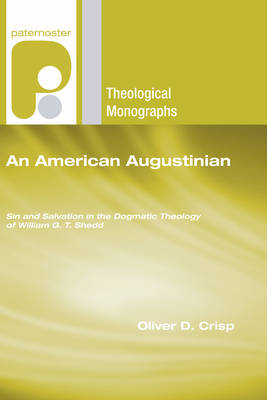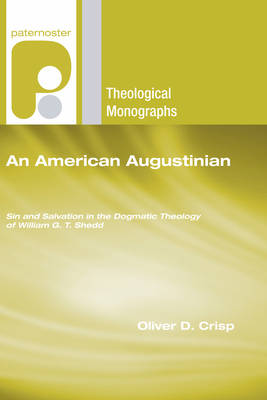
- Retrait gratuit dans votre magasin Club
- 7.000.000 titres dans notre catalogue
- Payer en toute sécurité
- Toujours un magasin près de chez vous
- Retrait gratuit dans votre magasin Club
- 7.000.0000 titres dans notre catalogue
- Payer en toute sécurité
- Toujours un magasin près de chez vous
40,45 €
+ 80 points
Format
Description
William G. T. Shedd has been hailed as one of America's most important dogmatic theologians. Yet, until now there has been no systematic study of his work. In this volume two central themes in his theology are explored with particular emphasis upon the philosophical issues Shedd's work raises and his significance as a dialogue partner for contemporary theologians. ""This book is no mere exercise in intellectual archaeology, for Crisp admirably draws out the implications of Shedd's thought for the contemporary debate on the crucial subjects of sin and salvation. Crisp represents Shedd's positions accurately and sympathetically, even when Crisp himself would develop the argument differently. I highly recommend this fine piece of philosophical theology (or, if one prefers, theological philosophy) and can only hope that it will stimulate renewed interest in Shedd--not only as an eminent theologian of great historical import, but as one who will now speak to the present generation."" --Alan W. Gomes, Talbot School of Theology ""Oliver Crisp convincingly shows that William G. T. Shedd was a reformed theologian whose dogmatics has a philosophical dimension which merits serious attention. In doing so he reveals the same intellectual qualities in evidence in his books on Jonathan Edwards and on Christology: philosophical clarity and rigour, theological sensitivity, and excellent judgement."" --Paul Helm, King's College, London ""Shedd possessed one of the greatest dogmatic minds of post-Reformation Protestantism, and this book will do much to commend him to a new readership. Written with Crisp's characteristic acumen and sense of the scope and material cohesion of Christian doctrine, it will be read with great profit by students of historical and systematic theology."" --John Webster, King's College, London Oliver D. Crisp is a lecturer in theology at the University of Bristol, UK. He is the author of Divinity and Humanity: The Incarnation Reconsidered (2007), Jonathan Edwards and the Metaphysics of Sin (2005), and coeditor (with Paul Helm) of Jonathan Edwards: Philosophical Theologian (2003). He has a PhD from the University of London.
Spécifications
Parties prenantes
- Auteur(s) :
- Editeur:
Contenu
- Nombre de pages :
- 216
- Langue:
- Anglais
- Collection :
Caractéristiques
- EAN:
- 9781556356582
- Date de parution :
- 01-11-07
- Format:
- Livre broché
- Format numérique:
- Trade paperback (VS)
- Dimensions :
- 154 mm x 229 mm
- Poids :
- 312 g

Les avis
Nous publions uniquement les avis qui respectent les conditions requises. Consultez nos conditions pour les avis.






